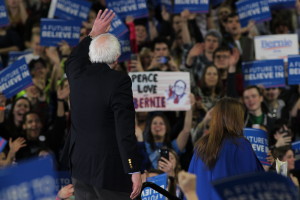Keep Talking: The Rise of Left-Wing Extremism in Trump’s America

If you’ve spent any time on the internet in the last week, it’s likely you’ve heard about The Daily Show host Trevor Noah’s interview with Tomi Lahren, a right-wing commentator and poor conservative attempt to relate to “the millennials.” While the most common reaction from liberal media has been that the interview marked a promising new future for the show post-Jon Stewart and that Noah’s calm and cool demeanour were an effective counterweight to Lahren’s incendiary hypocrisy on such issues as Black Lives Matter (BLM) and Colin Kaepernick’s protest, some on the left have sung a different tune. Recently, the Huffington Post published an article that speaks to the deepening rift among liberals, with the somewhat cumbersome title “Trevor Noah’s Interview With Tomi Lahren Is a Perfect Example of Why the White Liberal ‘Discourse’ Fetish Is So Damn Absurd.”
Although it’s worth reading in full, the main thrust of the article can be summed up in one of its most mind-boggling sentences: that “white people with the privilege of engaging in conversations with the conservative right that don’t involve the questioning of their very worth [should] pipe down about how important discourse is.” It is self-evidently paradoxical for a writer who later draws attention to his own whiteness to complain about a half-black South African commentator engaging with Lahren’s bigotry, and a prime example of a new and insidious form of the white-saviour complex. More and more white progressives with good intentions seem to feel they need to use their voice to tell other white people to be quiet, though they’re naturally speaking on behalf of (all) people of colour — that is, speaking for them. The irony is particularly strong in this case, since the person this well-meaning liberal is trying to silence is a person of mixed race.
More important, however, is the overall sentiment this article expresses. It is a feeling that perhaps has long existed in the left, but that has gotten more and more traction in the weeks following Donald Trump’s election. For every article wondering why Clinton lost, there are ten comments claiming that Democrats did nothing wrong and that we should be instead asking why Trump won. The answer for them is, inevitably, racism. Although in the months before the election many on both sides of the aisle rightly wrote about the soul-searching that is badly needed in the Republican Party, the result following November 8th has been that few on either side see the need to soul-search: Republicans can put off any conversation about how their platform has race-baited and encouraged fear and violence for decades because they won, while many liberals only feel more secure in the certainty of their moral superiority. Trump won because more Americans than we thought are racist, or at least willing to live with racism.
Right?
The real answer is both more complicated and more uncomfortable. To say that all those who voted for Trump voted for his misogyny, racism, and demagoguery is as facile as saying that all those who voted for Clinton voted for her hawkishness, her “flexible” views on environmental issues, and for the continuation of the political status quo. The Democratic Party has positioned itself more and more as a socially liberal organization, the champion of all those whom the system oppresses, yet Trump’s base of disenfranchised poor white voters have seemingly not qualified as oppressed. It has been easier to criticize their ignorance than it has been to talk about their quantifiable difficulty of accessing higher education, the growing problem of drug addiction in poor white communities, or the fact that eight out of ten states with the lowest life expectancy for people in the bottom income quartile largely overlaps with the now (in)famous Rust Belt — that strip of states Trump surprised the media by winning.

The easy alternative to the difficult task of extricating the legitimate, largely overlooked concerns of the right from the bigotry, however, is to not listen. Solving the problem means listening to the working class whites whom the Democratic Party has increasingly neither responded to nor resonated with. The way to escape the echo chamber, created by liberals who are often wealthier and better educated — i.e. privileged — than our right-wing counterparts is through discourse. To argue, as Darer does in his Huffington Post article, that discourse “is powerful because it validates” is a profoundly dangerous statement that is anathema to the very notion of education. It is the same mentality behind any push to ban books one perceives as offensive or controversial. Discourse and debate neither validate nor normalize: they can only ever breed understanding, and understanding and justifying are two very different things. Like the right-wing extremists who tell protesters to be quiet and “stop whining,” extremists on the left have, ironically, increasingly appealed to authoritarian thinking to combat Trump by telling his “deplorables” to stop talking. Rather than encourage debate — between people who feel safe to do so, as we can assume Lahren and Noah did — and thereby change the opinions people voice, many on both sides of the political spectrum have found it easier to try and stop their ideological opponents from talking altogether.
One of the biggest lessons this campaign can teach us on the left, particularly those of us privileged to be in academic institutions, is that liberal identity politics need to broaden. If we are going to be serious about championing the oppressed, we need to talk about class. In America in particular, economic class has always been a difficult thing to grapple with. In many ways, the “American Dream” is fundamentally opposed to class: under capitalism, poverty is either deserved or a (temporary) stepping-stone to future wealth. Poverty also so often breeds something we are deeply uncomfortable with: ignorance. It is difficult to sympathize with or defend people who use an offensive term or have an antiquated view of gender. It is easier to conflate ignorance with bigotry or malice than it is to recognize a certain amount of class privilege may come into the ability to know how to speak well or comprehend the nuances of identity.
Discourse isn’t universally possible or available, of course, as power makes your voice louder, and more dangerous, but to think that debate is a moral equalizer is to say we can only debate ourselves. It is to say that truth will not only fail to convince the Ann Coulters of the world, but that the ideological camps are closed for good, and there will be no defections. The echo chamber is of our own making. In the increasingly frightening political and social climate of the West, it is more important than ever for conservatives, as well as liberals, to speak and, more radically, to listen.
